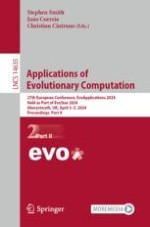2024 | OriginalPaper | Buchkapitel
Hybrid Surrogate Assisted Evolutionary Multiobjective Reinforcement Learning for Continuous Robot Control
verfasst von : Atanu Mazumdar, Ville Kyrki
Erschienen in: Applications of Evolutionary Computation
Verlag: Springer Nature Switzerland
Aktivieren Sie unsere intelligente Suche, um passende Fachinhalte oder Patente zu finden.
Wählen Sie Textabschnitte aus um mit Künstlicher Intelligenz passenden Patente zu finden. powered by
Markieren Sie Textabschnitte, um KI-gestützt weitere passende Inhalte zu finden. powered by
